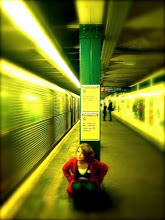
Initially after getting laid off from The Free Lance, I shrugged off the idea of ever working for a newspaper again. 'It was never my dream to work for a daily,' I told myself, along with the reassurance that I would freelance. For sure. As much as this was really me just trying to assuage my devastation at being let go from my first "REAL JOB," it also was true: I never wanted to work for a daily. Long form, magazine pieces were both my forte and where my interest lied. But after moving on from the Free Lance and into a less-than-academic profession (ahem, job), I've realized how much I enjoyed the daily. For one thing, it's difficult to write a long-form piece without initially writing a short one - after all, how do you go in depth on a topic without becoming initially familiar, as naturally happens when you're following a beat.
At any rate, I have been missing the daily paper world, and in the past couple months I have again begun applying to newspapers. It's been rough for multiple reasons: no one's hiring, I'm hesitant to return after my first experience, and - well, did I mention newspapers are dying and no one is hiring?
On Tuesday journalismjobs.com posted two links for Queens newspapers looking for reporters. These were both weekly community papers, but a real chance for me to get myself writing again. I quickly brushed up my cover letter and resume and sent them out. Surprisingly quickly, I received a response from the editor of one of the papers. In, what I'll assume was a mass email, he requested that those still interested pitch three possible stories they would write while working at the paper. He also cautioned: "First, let's be clear about the position. It is full-time, absolutely requires that you have a car and pays in the low-20s based on numerous factors. This is an entry-level reporter position. Have no illusion of clocking out at 5 p.m. or having your weekends free."
While I appreciate the honesty of the response, it really got me thinking: who can afford to be a journalist anymore? This position would require me taking a pay-cut from my current job and adding the (significant) expense of a car in New York City. The cost of living here alone would not be covered by that salary, and the post makes it very clear that a second job to help cover expenses would be out of the question. So essentially, this newspaper job would require some kind of financial support - probably in the form of mommy and daddy bank. So often life's roadblocks based on socio-economic class are analyzed at a younger age: specifically, money preventing people from pursuing higher education. But what about after you get that degree? My parents are by no means poor, and have helped me pass many of these hurdles with their financial support (OK, and emotional, and every other kind...) They paid for my college and helped me out during my two unpaid internships, and would be there for me if I needed them even now. I am aware of how lucky I am to have that safety net. But they are in no position to be providing constant fiscal support to their almost-25-year-old daughter. Nor do I believe this would meld very well with their beliefs about parenting. So, children of middle class families can't afford to be journalists, clearly no one coming from less can afford it either...but who can? And is this really how newspapers will be saved, by selecting from an incredibly narrow pool of applicants?
Gawker had an article last week about youth paying for internships. As I have looked for jobs on journalismjobs.com and craigslist, I've noticed more and more companies are trying to get by using unpaid interns, banking on the desperation of those freshly out of college (am I still considered "freshly out of college?") trying to get experience. A girl I went to college with told me about a week ago she was forced to lay off her first employee - someone only slightly newer at the job than she. This person was replaced, you guessed it, with an unpaid intern. I'm certain the only reason that jobs are asking for money for internships is that people are willing to pay. Just as someone will not only take the position at the queens newspaper, they will be grateful to have a job as a working journalist.


